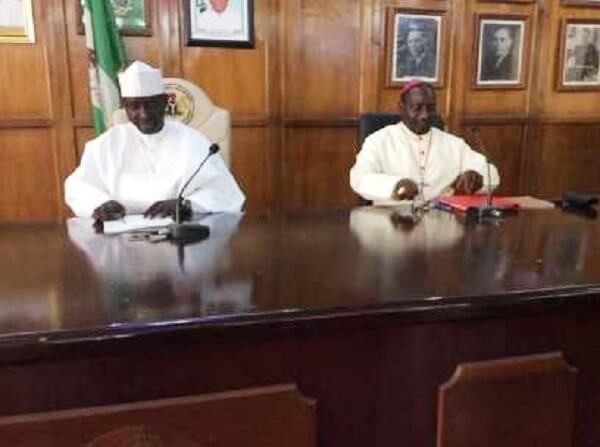
Religious Preaching Bill before the State House of Assembly has raised tension among members of both dominant religions in the State. In an attempt to stem the tide, the Kaduna Government on Wednesday met with the leadership of the Christian Association of Nigeria (CAN) in the State.
Barnabas Yusuf Bala, the State Deputy Governor, led the government’s delegation while Dr. George Dodo, the State Chairman of CAN, led 11 others where the issue was clarified on the bill. The meeting held at the old chamber of the Sir Kashim Ibrahim House.
At the opening of the meeting, the Deputy Governor stated that the Bill was necessary to curb religious extremism and hate speech. Both the parties then proceeded to a closed-door session.
Advertisement
He stated that the government was committed to ensuring that religion can be practiced in a safe and secure climate. He specified the government’s objective to the CAN delegation that the government has a duty to ensure that religious violence no longer threatens the state.
Bala explained that the Religious Preaching Law was not new in the state, stressing that the military under General Buhari created the law in response to religious crises in the State between 1983 and subsequently amended till 1987.
He acknowledged that “this is the first time that the legislation is passing through a democratic process, with all the transparency that the public hearing and other legislative processes of the House of Assembly entails”.
“We swore to uphold the Constitution which recognizes the freedom of religion and thought as fundamental rights. The same Constitution obliges us to ensure the safe exercise of these rights by legislating in the interest of public safety, public order, public morality or public health, and for the purpose of protecting the rights and freedom of other persons.”
Advertisement
“This is not a new law. It has existed since 1984, with amendments in 1987 and 1996. The military governments which created the law were responding to outbreaks of religious violence such as Maitatsine in 1983; the riots after the Kafanchan incidence of 1987.
“Proposing this amendment is a deliberate decision by the government to subject the law to a democratic process, rather than just enforce the provisions of the edict as passed since 1984.”
“Kaduna State has a history of Religious/Sectarian Crisis and what this Bill seeks to do is not anything new but to learn from painful experience, and discourage the use of religion for violence and division.
“The Bill, by virtue of Section 45(1) of the 1999 Constitution, is in order and does not offend the provisions of the constitution. The provisions of the Bill are in tandem with the Constitution.”
Section 45(1) of the 1999 Constitution in relation to the meeting implies that the Freedom of Religion among others shall invalidate any law that is reasonably justifiable in a democratic society in the interest of defense, public safety, public order, public morality or public health; or for the purpose of protecting the rights and freedom or other persons
Advertisement
The deputy governor further noted that there was nothing to suggest that government is out to “abolish, stop or derogate on the freedom of religion and religious beliefs.”
“It merely seeks to ensure that religious preaching and activities in the state are conducted in ways that do not threaten public order, public safety, and to protect the rights and freedom of other persons,” he added.


